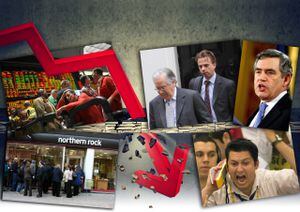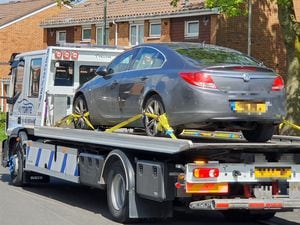Is there another credit crunch on the horizon?
Call it the Credit Crunch, the Global Financial Crisis or the Great Recession, it was the biggest economic disaster to hit the UK – and the rest of the world – since the Great Depression of the 1930s.

And a decade later, there are increasing fears that it could happen all over again.
Personal debt is even higher than it was before the slump, thanks to credit card borrowing and the booming market in car loans.
We are even seeing reports that sub-prime mortgages are back on the market.
These were the seemingly nonsensical products that, effectively, provided a mortgage and the illusion of home ownership to people who hadn't a hope of being able to maintain their payments.
They were dubbed 'ninja loans – no income, no job, no assets". But, like the last time around, too-smart-for-their-own-good finance experts have decided that if you bundle enough duff loans and mortgages together you somehow have something with real value, as opposed to a ticking timebomb.
It was the Spanish philosopher George Santayana who came up with one of the definitive quotes on this kind of behaviour a century ago: "Those who cannot remember the past are condemned to repeat it."
The trouble is we all remember it, we just don't want to. We want to be able to buy stuff we can't afford, so we get into debt, and the bankers and finance industry is only too happy to help us, because that's how they make those enormous profits.
Because the bankers and financial experts who helped land us in the mess have never really accepted their responsibility for it.
A bit of disgrace for the likes of Fred Goodwin, the Royal Bank of Scotland chief executive stripped of his knighthood, and a few minor bit-players jailed for more obvious wrong-doing. But nearly everyone else got off scot-free with their millions largely intact.
How about the unnamed former banker at Lehman Brothers who has claimed he was "hurt by the crisis as much as anyone" after losing his bonus following the lender's disastrous collapse. Lehman was just the first in a string of autumn disasters in 2008 that left the world's financial institutions nursing losses of $2.8 trillion.
Risky ‘casino’ bank deals, risky lending and unsustainable levels of debt, both public and private, came together in a toxic cocktail that created the crisis. Thousands lost their jobs, their savings and even their homes.
Northern Rock disappeared, HBOS had to be rescued by Lloyds and RBS has admitted recently it is unlikely the Government will ever get back all the £45.5bn bailout it received.
Depite that, there has been almost constant pressure, starting just a few years after the credit crunch, that we should all "stop being nasty to bankers". Of course, they weren't the only ones. Politicians and most economists failed to see the danger signs until it was too late.
Some have learned their lessons. Even Gordon Brown, the Prime Minister who watched the global economy go to hell in a handcart on his watch, has expressed fears that it could all happen again: "We are in danger of sleepwalking into a future crisis. There is going to have to be a severe awakening to the escalation of risks, but we are in a leaderless world."
But the finance industry, keen to get back to the business of making ever-greater profits, would rather blame the regulations that covered investments and banking at the time – either too harsh or to relaxed – than accept the whole system was gripped by almost wilful stupidity and greed. And it took the rest of us with it.
Ten years on, strip out the impact of inflation and wages are no higher than they were in 2005. Working people bore the brunt of the crisis with years of below-inflation pay rises. And unemployment soared to 2.6 million by 2011.
Fewer businesses went bust that in the previous 1992 recession, but business productivity in the UK has stagnated. Housebuilding has not recovered, while high prices have left Generation Rent coming to terms with never owning a home of their own.
Professor Mike Haynes, at the University of Wolverhampton's Business School, watched the drama unfold and has kept track of the fallout over the last decade. His findings make for grim reading: "In 2008 capitalism was on the verge of meltdown. Instead of being a stable mountain of hard rock, the banking system had become a slag heap of bad debt. And as it began to slide, it threatened to overwhelm us all. But many people still believe that instead of saving the day the cause of the crisis was the government.
"In fact it took the effective nationalisation of key banks and huge injection of money – what is called quantitative easing – to keep things afloat. Interest rates were crashed to near zero. These measures may have saved 1.5 million jobs according to the Bank of England. But the governments did – and continue – to act in a way many of us think crazy. They handed out money by the shed load to the banks to keep them afloat and imposed austerity on the rest of us. Nothing constructive was done to push the economy forward. Companies remained as starved as ever for outside investment.
"The result is that productivity has stagnated and wages have experienced their worst decade for 200 years. People have borrowed and UK households are now some of the most indebted in the advanced world.
"No one can predict exactly when the next crisis will come. They seem to take place every 10-15 years. So it looks like we are due one. There will not be much slack to cope with it. Household debt is too high. The Government has cut the public sector back to the bone. Companies have held off on investment. And the banks? They seem just as powerful and irresponsible as ever."





